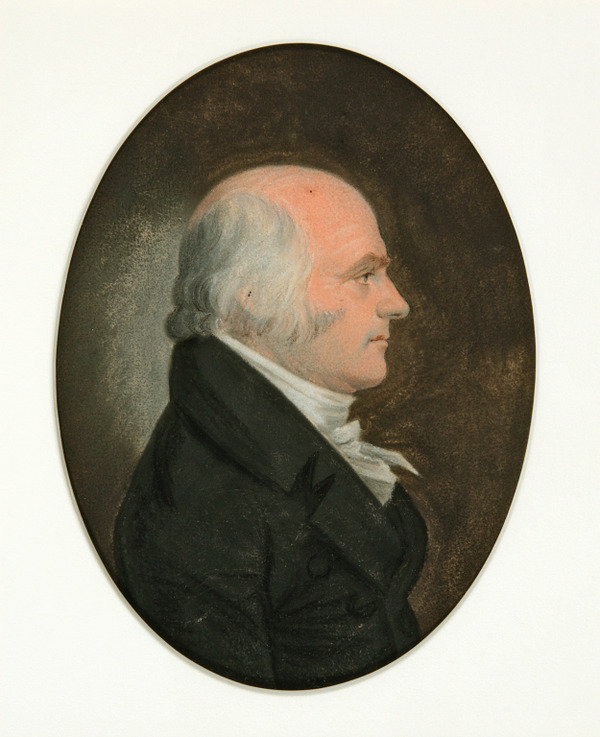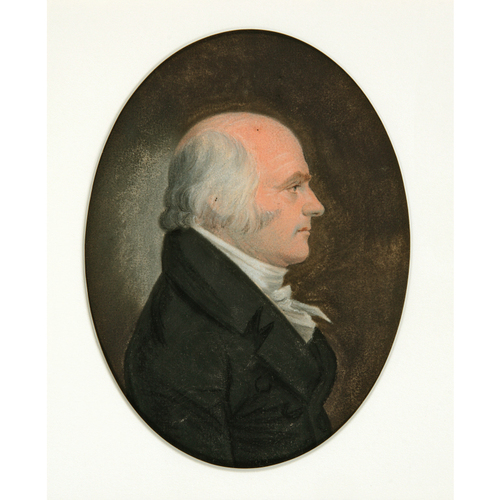
Source: Courtesy of Wikimedia Commons
AULDJO, ALEXANDER, businessman, militia officer, jp, and politician; b. 21 Oct. 1758 in Aberdeen, Scotland, son of John Auldjo, baker and manufacturer, and Margaret McKenzie; d. 21 May 1821 in London.
Alexander Auldjo arrived in Montreal about 1778. During the 1780s he invested considerable sums in the fur trade – some £3,000 in 1782 for example – stood security for fur traders, sold properties, and administered estates. In 1785 he was in partnership with William Maitland, and the following year they and Richard Dobie* bought a substantial quantity of wheat for export. By 1795 the firm of Auldjo and Maitland was dealing extensively in the sale of bills of exchange.
Auldjo and Maitland had expanded to become Auldjo, Maitland and Company by 1800. Supplied in part from London by Auldjo’s younger brother John, it imported a wide variety of manufactured goods, which it sold in Lower Canada or forwarded to Upper Canadian storekeepers in return for flour and ashes. The Upper Canadian trade was not without difficulties. In 1800 preferential treatment given to cargo belonging to James and Andrew McGill and Company in the loading of government boats at the key port of Kingston put Auldjo, Maitland at a disadvantage. In addition, as Thomas Cummings, a Chippawa merchant deeply indebted to Auldjo, Maitland, was warned in 1807: “Your goods are better on your Shelves than sold to doubtful people ye giving of inconsiderate credit has been ye ruin of many in your province, as well as in this.” In order to turn to account rapidly changing market conditions, Auldjo, Maitland advised Cummings forcefully on what and when to buy and sell. The firm attended in the same businesslike manner to the education of Cummings’s children in Montreal. According to an Albany, N.Y., merchant, in 1803 Auldjo, Maitland was among the principal firms sending bateaux from Montreal to Upper Canada and exported merchandise worth some £36,000, making it, in his estimate, fifth among the city’s exporters.
Auldjo invested heavily in real estate, notably in Upper Canada between 1797 and 1807; there he owned farm lots scattered throughout the province. (In 1829 his estate included 30 of these properties, totalling 5,450 acres.) In addition, he dealt occasionally in property at Montreal, owned land in Lower Canada, and apparently acted as the agent of individuals and groups in the Eastern Townships who were petitioning for grants.
Auldjo was already a leader among Montreal businessmen by the late 1780s. In January 1787 he was on a committee composed of the principal merchants of the city whose members testified before a committee of the Legislative Council on commerce and the police established by Lord Dorchester [Guy Carleton*] the previous year. The merchants demanded, among other things, a reorganization of the administration of justice, the introduction of a school system, a land registry office, and a bankruptcy law, as well as the building of a new prison in Montreal and the incorporation of the city; they also reiterated a long-standing demand for an elective assembly. The same year Auldjo was a captain in Montreal’s British militia. He was a charter member of the Agriculture Society’s Montreal branch in 1790, and that October joined with a number of leading firms and businessmen of the city to demand complete freedom of navigation in the fur-trade interior.
In the elections to the House of Assembly in 1792, Auldjo was defeated in Montreal West, but he won one of the riding’s two seats in 1796. During his only term he strongly supported the English party, led in the house by two of the colony’s most prominent merchants, John Richardson and John Young*. Auldjo particularly pressed for improvements in transportation, especially to navigation on the upper St Lawrence; in 1805 he would be named a commissioner for the improvement of inland navigation between Montreal and Lachine. He was made a justice of the peace in Montreal in 1796 and a warden of Trinity House of Quebec four years later. Auldjo may have become better connected in the Montreal business community through his marriage on 21 Jan. 1804 in Portsoy, Scotland, to Eweretta Jane Richardson, who was probably John’s sister; they were to have two sons and a daughter, but the latter died shortly after birth in 1808, along with her mother. Auldjo likely had informal business relations with Richardson.
In 1804 Auldjo was named the agent for the Canadas of the Phoenix Assurance Company of London, such an agency having been requested by merchants in Lower and Upper Canada. With a monopoly in the field, Auldjo at first was concerned only to increase the demand for insurance, determine premium rates, and make customers aware of their responsibility for policy renewals “in a country through which a regular post is not established” and the sending of renewal notices “cannot always be done with precision or certainty.” The rates he calculated “on risks in the cities of Quebec and Montreal, where the houses in general are built of stone, and many fire proof”; premiums were higher for buildings “in the suburbs of those Cities and the other towns and villages of Lower Canada, as well as those of Upper Canada, which are mostly built of wood.” In 1808, following upon a report by a Phoenix representative who had been sent to the colony and on orders from head office, Auldjo announced that Quebec’s Lower Town was considered a fire-trap and thenceforth uninsurable. Indignant policy holders organized a lobby of the Phoenix head office by important London firms trading to Quebec. In July 1809 Auldjo advertised Phoenix’s readiness “to revive their connections with the Lower-Town of Quebec to a certain extent, and under certain regulations.” The company’s reputation there had been dealt a serious blow, however; in April 1811 Auldjo was obliged to offer reduced premiums to Lower Town property owners, and in June he appointed an agent at Quebec to handle policy renewals. Later Phoenix would meet stiff competition by a locally organized company [see George Garden]. From 1807 Auldjo also represented the Pelican Life Insurance Company.
Like many prominent Montreal businessmen, Auldjo was a member of the Scotch Presbyterian Church (later known as St Gabriel Street Church); elected to its temporal committee in 1809 and 1810, he was vice-president the first year and president the second. He had continued active in the militia. By 1812 he was lieutenant-colonel of Montreal’s 1st Militia Battalion, and on 6 July 1812 he was made lieutenant-colonel commanding the newly formed Montreal Militia Battalion. However, he resigned his commission on 25 Sept. 1813 and that year departed for Britain. He apparently took up residence in London.
In 1813 the partners in Auldjo, Maitland and Company were Auldjo himself, Maitland (who had been representing the firm in London since about the beginning of the century), and George Garden; within two years the firm had changed its name to Maitland, Garden, and Auldjo with the addition of Auldjo’s nephew George Auldjo*, and it seems likely that Alexander Auldjo had retired. Clearly, however, Alexander continued to harbour an interest in Lower Canadian business affairs. At the behest of John Richardson in 1816, he hired an experienced Scottish road builder for the Montreal turnpike project, and three years later, after consulting with the renowned British canal engineer Thomas Telford, he engaged Thomas Burnett to design the Lachine Canal and supervise its construction. Meanwhile, in 1817 he and Maitland, on their own, had become two of only five London subscribers to the newly founded Bank of Montreal. Possibly active in the small London community of merchants formerly inhabiting Lower Canada, Auldjo was an intimate friend of one of them, Adam Lymburner*. Auldjo died in London in 1821, aged 62, and was buried in St George’s Church, Bloomsbury.
PAC, MG 11, [CO 42] Q, 30: 195–96; MG 23, GIII, 30; MG 24, D43; L3: 6601–2, 30528–33; MG 55/23, no.12 (Edward Watts); RG 1, L3L: 45–57, 65–113, 349, 518, 1306, 1537, 1664, 1681, 2115, 2440–50, 4461–66, 5058–73, 5132–35, 5146, 17736–89, 26831–59; RG 4, B28, 115; RG 43, CIII, 1, vol.2453, 26 July 1819; RG 68, General index, 1651–1841: 187, 211, 333–34, 339, 698. QUA, Auldjo papers, box 1, folder 1, John Richardson to J. B. Forsyth, 25 March 1829. Docs. relating to constitutional hist., 1759–91 (Shortt and Doughty), 920. Douglas, Lord Selkirk’s diary (White), 232. Kingston before War of 1812 (Preston), 212. L.C., House of Assembly, Journals, 1805: 94–96; 1807: 100; Statutes, 1805, c.6. Montreal Gazette, 31 Jan. 1851. Quebec Gazette, 25 Oct. 1781; 27 June, 10 Oct. 1782; 7 Aug. 1783; 4 March, 15 July, 28 Oct. 1784; 3 Nov. 1785; 5 June, 11 Dec. 1788; 20 Aug., 12 Nov. 1789; 15 April, 28 Oct., 4 Nov. 1790; 16 June, 27 Oct. 1791; 31 May, 19 July 1792; 12 Sept., 3 Oct. 1793; 24 July, 11 Dec. 1794; 26 Feb. 1795; 26 Jan., 11 May 1797; 25 July, 19 Dec. 1799; 27 Nov. 1800; 11 March, 3 June 1802; 19, 26 July, 30 Aug. 1804; 16 May 1805; 9 Jan., 20, 27 March, 1 May, 23 Oct. 1806; 5, 26 Feb. 1807; 1 Sept., 29 Dec. 1808; 16 March, 6, 13 July 1809; 12 July 1810; 4 April, 4 July 1811; 4, 11 June, 9 July, 10, 17 Sept., 12 March 1818; 2 Nov. 1820; 16 July 1821; 13 June, 8, 15 Aug., 26 Sept. 1822; 4 Sept. 1837. F.-J. Audet, Les députés de Montréal, 150–51. Massicotte, “Répertoire des engagements pour l’Ouest,” ANQ Rapport, 1943–44: 410; 1945–46: 236, 291, 295, 318. Officers of British forces in Canada (Irving), 164–65. Quebec almanac, 1788: 52; 1791: 84. “State papers – L.C.,” PAC Report, 1891: 141. R. Campbell, Hist. of Scotch Presbyterian Church, 99. Denison, Canada’s first bank, 1: 92. Innis, Fur trade in Canada (1962), 184. Miquelon, “Baby family,” 191–94. Paquet et Wallot, Patronage et pouvoir dans le Bas-Canada, 129. Phoenix Assurance Company Limited, First in the field . . . ([Toronto, 1954]). Robert Rumilly, Histoire de Montréal (5v., Montréal, 1970–74), 2: 83, 134. Tulchinsky, “Construction of first Lachine Canal,” 39. E. A. Cruikshank, “A country merchant in Upper Canada, 1800–1812,” OH, 25 (1929): 145–90. Hare, “L’Assemblée législative du Bas-Canada,” RHAF, 27: 375. “L’honorable Adam Lymburner,” BRH, 37 (1931): 558. Richard Lessard, “L’arrière-fief Hope,” BRH, 33 (1927): 307. É.-Z. Massicotte, “Quelques maisons du vieux Montréal,” Cahiers des Dix, 10 (1945): 260. P.-G. Roy, “La Trinity-House ou Maison de la Trinité à Québec,” BRH, 24 (1918): 105–10.
Cite This Article
Gerald J. J. Tulchinsky, “AULDJO, ALEXANDER,” in Dictionary of Canadian Biography, vol. 6, University of Toronto/Université Laval, 2003–, accessed December 21, 2024, https://www.biographi.ca/en/bio/auldjo_alexander_6E.html.
The citation above shows the format for footnotes and endnotes according to the Chicago manual of style (16th edition). Information to be used in other citation formats:
| Permalink: | https://www.biographi.ca/en/bio/auldjo_alexander_6E.html |
| Author of Article: | Gerald J. J. Tulchinsky |
| Title of Article: | AULDJO, ALEXANDER |
| Publication Name: | Dictionary of Canadian Biography, vol. 6 |
| Publisher: | University of Toronto/Université Laval |
| Year of publication: | 1987 |
| Year of revision: | 1987 |
| Access Date: | December 21, 2024 |



